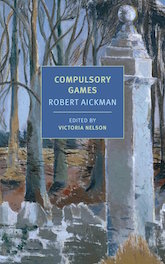For far too long, Robert Aickman has resided in a bookish limbo. He’s not quite gone—small presses have kept his work available for readers with daring taste and deep pockets—and he’s certainly not forgotten—writers like Peter Straub and Neil Gaiman never fail to name him when asked favorite authors—but he’s not quite here either. Like his stories, which aren’t quite fantasy and aren’t quite ghost stories, and like his characters, frequently caught between the everyday and the impossible, Aickman has seemed stuck between here and there. New York Review of Books Classics has just published a new Aickman volume, Compulsory Games. At long last, American readers have easy access to one of the world’s great purveyors of the uncanny, the unknown, and the uncomfortable.
Although he wrote at least one novel, The Late Breakfasters, and one novella, The Model, the majority of Robert Aickman’s published fiction—there are rumors of completed books awaiting editing, and some stories first appeared thirty years after their author’s death—are short stories. Not for Aickman the story cycle or the recurring character: although there are types of protagonists he favors, each story stands alone and inscrutable. Even on the rare occasions that the supernatural force in an Aickman story adheres to genre rules—oh, that’s a vampire!—the familiarity never becomes conventionality.
Buy the Book


Compulsory Games
Even were the plots classic and his characters standard, Compulsory Games would remain a joy for the sheer pleasure of its author’s voice. Aickman’s prose has a mid-century suppleness; both quotidian routine and bewildering exceptions proceed in the same elegant, measured voice. Though Aickman may elide some details, we’re rarely in doubt as to what is seen and what is done. An event’s meaning almost always remains shrouded; the fact of the event does not. If Aickman plays games with his readers and with his characters, the play is as compelling as the rules are obscure. The denouement of “Wood,” for example, features a horrendous transformation, a mysterious wooden house that also seems to be a machine, and a mysterious rhyming poem. Like a dream, it makes emotional sense, but not conventional sense; like a nightmare, it leaves you sweating and unsettled.
There’s a certain wickedness even in Aickman’s very titles. What sort of game, after all, is “compulsory?” The sibilant ‘s’ of “compulsory” snaps like a headmaster’s rod on bare flesh; Aickman’s stories evince a very British perversity, discreet, detached, and wry. Here, for example, is one story’s ending:
“as to what had happened to her, the pathologist ultimately declined to make a declaration. The press thought it might have been rats, and it was mainly that hypothesis which caused the scandal, such as it was. “
The rats make me shudder; the “such as it was” makes me chuckle.
For years, most of Aickman’s stories were either out-of-print and difficult to find or else available only in expensive small press editions. Faber & Faber re-released several Aickman collections (Dark Entries, Cold Hand in Mine, The Unsettled Dust, and The Wine-Dark Sea) in the UK a few years ago. After an unconscionably long delay, these paperbacks have begun showing up in American bookstores. Americans lucky enough to own the Faber titles can purchase Compulsory Games with confidence, as it only includes stories not available in those selections. I’m of two minds about the assortment of stories featured in Compulsory Games. On one hand, I appreciate that the book isn’t redundant to readers of the Faber collections and that it makes available some of the less-reprinted stories from Tales of Love and Death and Intrusions. On the other, it’s a little vexing to read praise for stories like “The Trains” in editor Victoria Nelson’s introduction, then to flip to the Table of Contents and realize that it’s not included.
Nelson’s introduction, like her selection of stories, left me ambivalent. She’s a keen analyst on the “outrageous left turns” that so frequently bedevil Aickman’s characters, and Nelson’s endorsement of Aickman makes a few unexpected swerves that left this reader not so much uneasy as annoyed. Nelson is very good indeed on Aickman’s techniques, on his unexpected details and uncomfortable developments, on his personal obsessions and romantic entanglements, on his dull men and his fascinating women. Would that the introduction were half as long as it is, however, since in the second half a certain snobbery and defensiveness manifest. Nelson seems appalled that Aickman has, thus far, been “celebrated almost exclusively in the fantasy fandom world.” All this in a book with a prominent back cover blurb from Neil Gaiman! Similarly, she dings the four recent Faber reissues of Aickman for bearing “gentle children’s fantasy covers,” without pausing to reflect on what Aickman’s publication by Faber, one of Britain’s foremost literary publishers, might indicated about his changed reputation. And the New York Review of Books’ publishing of Compulsory Games more or less assures that this book, at least, will be shelved in Literature wherever books are sold.
Despite my very slight reservations about the selection and the introduction, Compulsory Games should rank as a compulsory purchase for all lovers of the strange, the beautiful and the baffling. Aickman is a master, and it is a rare and undiscerning reader who, having once read one of his tales, will not want to read all of them. The narrator of one story, ostensibly the author himself, notes “strangeness usually takes an unexpected form, it is no good looking for something strange.” I must humbly disagree: anyone looking for the strange, or for the marvelous, should go to the bookstore immediately.
Compulsory Games is available from New York Review Books.
Matt Keeley reads too much and watches too many movies; he is helped in the former by his day job in the publishing industry. You can find him on Twitter at @mattkeeley.










